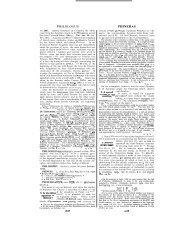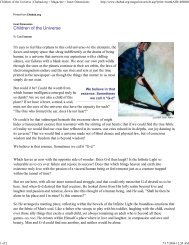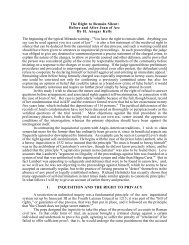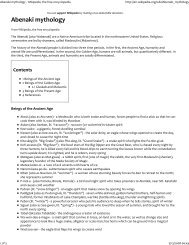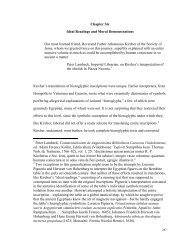sefi;g:v. - A Kabbalist walks into a bar, and the
sefi;g:v. - A Kabbalist walks into a bar, and the
sefi;g:v. - A Kabbalist walks into a bar, and the
You also want an ePaper? Increase the reach of your titles
YUMPU automatically turns print PDFs into web optimized ePapers that Google loves.
SELEUCIDE SELEUCIDE<br />
Syrian suzerainty over Judaea was fully asserted.<br />
Next occurred <strong>the</strong> final attempt of <strong>the</strong> Seleucidae to<br />
overthrow <strong>the</strong> formidable Parthian power which had<br />
wrested from <strong>the</strong>m so much of <strong>the</strong>ir eastern possessions.<br />
In 130 B.C. Antiochus undertook an expedition against <strong>the</strong><br />
Parthians. His bro<strong>the</strong>r Demetrius was still in <strong>the</strong>ir h<strong>and</strong>s,<br />
having twice been recaptured when he attempted escape. Three<br />
victories gave <strong>the</strong> Syrian king <strong>the</strong> possession of Babylonia, <strong>and</strong><br />
brought to his st<strong>and</strong>ard all <strong>the</strong> peoples who had been reduced<br />
under <strong>the</strong> Parthian yoke.4 Phraates opened negotiations with<br />
Antiochus to amuse him, while he prepared once more to try<br />
his fortune in <strong>the</strong> field (Diod. 35 IS); more effective still was <strong>the</strong><br />
stroke by which Demetrius was at last released from captivity<br />
in order to cause <strong>the</strong> withdrawal of <strong>the</strong> Syrian forces. In <strong>the</strong><br />
next collision with <strong>the</strong> Parthian trcops Antiochus fell, bravely<br />
fighting (Appian, Syr. 68; Justin, 38 IO). His entire army was<br />
cut to pieces.<br />
The Parthian king, having thus won <strong>the</strong> victory by<br />
arms, keenly regretted having set Demetrius at liberty<br />
16. Demetrius (see 5 14), <strong>and</strong> tried to recapture him,<br />
He tried next to undo his<br />
(second<br />
II., Nicator hut failed.<br />
reign, work by sending <strong>into</strong> Syria a second<br />
129-126 B,C.). pretender, a son of Antiochus, <strong>the</strong> late<br />
king, Seleucus by name, who had fallen<br />
<strong>into</strong> his h<strong>and</strong>s. This also proved of no avail. Demetrius,<br />
however, did not long enjoy his change of fortune.<br />
1 'In Sida urbe educatus, quapropter Sidetes utique vocahatur'<br />
(Eus. Chron. 1255). On his coins Antiochus VII. calls<br />
himself Euergetes, which was, <strong>the</strong>refore, his true official title.<br />
Jos. Ant. xiii. 7 I calls him &njp.<br />
2 On his coins Tryphon calls himself BauiAoLs ahoKp&op,<br />
which no o<strong>the</strong>r Syrian ruler does.<br />
3 This Anticchus was not hostile to <strong>the</strong> Jewish faith, <strong>and</strong> for<br />
his tolerance was called EusebCs (' pious '), Jos. Ant. xiii. 8 2.<br />
4 For <strong>the</strong>se victories Antiochus received <strong>the</strong> title Great<br />
(Dittenb. Sylkp,ll) 244 <strong>and</strong> 245, BalrrA\ioc pcydhov 'AWL~XW,<br />
cp Justin, 38 10 : ' Magnus haheri ccepit ').<br />
4357<br />
See ANTIOCHUS, 5.<br />
He was induced to enter <strong>into</strong> war with Egypt on behalf<br />
of Cleopatra XI., sister-wife of Ptolemy Physcon,' <strong>and</strong><br />
his own mo<strong>the</strong>r-in-law, who had taken refuge in Syria.<br />
The war with which he was thus threatened Physcon<br />
evaded by setting up Alex<strong>and</strong>er Zabinas, a pretended<br />
son of Alex<strong>and</strong>er I. Bala, to claim <strong>the</strong> Syrian throne.*<br />
Supported hy a strong Egyptian army <strong>the</strong> pretender invaded<br />
Syria, where several cities fell away from Demetrius The<br />
decisive battle was fought in 125 B.C. near Damascus, <strong>and</strong><br />
Demetrius was defeated. He fled to Ptolemais to his wife<br />
Cleopatra, who refused to receive him <strong>and</strong> when he tried to<br />
enter Tyre, had him murdered (Justid, 39 i, Appiau, Syr. 68,<br />
Jos. Ant. xiii. 9 3).<br />
Little is known of <strong>the</strong> rule of Alex<strong>and</strong>er 11. ; but one<br />
authority at least passes a favourable verdict8 He<br />
lllex<strong>and</strong>er entered <strong>into</strong> friendly relations with<br />
by Phraates 11. as Arsaces Philopator Epiphanes Philhellen<br />
(reigned 136-127 B.c.). It seemed hetter to this monarch to<br />
retain Demetrius in order to he able to use him in case of<br />
threatening circumstances.<br />
Whilst Demetrius was a captive in <strong>the</strong> h<strong>and</strong>s of <strong>the</strong><br />
Parthians (see above, § 14) his younger bro<strong>the</strong>r Antio-<br />
16, Bntiochus chus Sidetes, who owed his surname to<br />
vII., sidetes <strong>the</strong> fact that he had been brought up at<br />
(138-129 B.C.). Side in Pamphylia (see SI DE),^ asserted<br />
his claims to <strong>the</strong> kingdom of Syria<br />
(I MRCC. 15 13 ). He was now sixteen years old. His<br />
attempt succeeded, perhaps chiefly because he was joined<br />
by queen Cleopatra Thea, who, enraged at <strong>the</strong> union of<br />
Demetrius with <strong>the</strong> daughter of <strong>the</strong> Parthian king,<br />
went over to <strong>the</strong> side of Antiochus, <strong>and</strong> surrendered to<br />
him <strong>the</strong> strong tower of Seleucia, near Antioch, which<br />
Hyrcanus, influenced largely, no doubt,<br />
during all <strong>the</strong>se years she had held for Demetrius.<br />
Tryphon was defeated <strong>and</strong> driven <strong>into</strong> <strong>the</strong> Phcenician town of <strong>sefi</strong>;g:v. by <strong>the</strong> desire to find support against<br />
Dora, where he was besieged. Thence he escaped to Apamea,<br />
Egypt, from which power he soon<br />
but was again besieged, aud compelled to end his life by his own became estranged (Jos. Ant. xiii. 93). He was, in fact,<br />
h<strong>and</strong> (I Macc. 15 1037 ; Strabo, 668 ; Jos. Ani. xiii. 7 2; Appian, not left to enjoy his usurped dignity long without<br />
Sur. 6Q.2<br />
Antiochus married Thea (' <strong>the</strong> objectionable but<br />
rivals. Immediately upon <strong>the</strong> death of Demetrius II.,<br />
evidently inevitable adjunct of <strong>the</strong> Syrian throne,'<br />
Seleucus, <strong>the</strong> son of <strong>the</strong> murdered king, laid claim to<br />
Holm, Grk. Hist. 4419). <strong>and</strong> acted very vigorously to<br />
<strong>the</strong> throne, only to be murdered after a few months by<br />
unite again <strong>the</strong> severed fragments of <strong>the</strong> Syrian kingdom<br />
<strong>the</strong> infamous Cleopatra Thea, his mo<strong>the</strong>r, who was<br />
(Justin, 361). First <strong>and</strong> foremost came <strong>the</strong> necessity<br />
indignant that he should have taken such a step without<br />
of dealing with Palestine, which in <strong>the</strong> turmoil of <strong>the</strong><br />
her, <strong>and</strong> without sharing <strong>the</strong> power with herself.<br />
past few years had absorbed large tracts of Syrian<br />
Cleopatra <strong>the</strong>n put forward <strong>the</strong> second son of Demeterritory,<br />
<strong>and</strong> attained an almost completely indetrius<br />
11. as heir to <strong>the</strong> throne; his claim was also<br />
pendent position, even entering <strong>into</strong> diplomatic relations ls. Antiochus supported by Egypt. Alex<strong>and</strong>er 11.<br />
with distant <strong>and</strong>, in part, hostile powers (I Macc.105gJ vIII., Grypus4 was defeated <strong>and</strong> fled to Antioch, <strong>and</strong><br />
121f. 14163 24). In 135 B.C. Antiochus invaded (12s-96 B,c.). <strong>the</strong>n to Seleucia (Diod. Sic. 3528.<br />
Judaea in person. Already, three years previously, <strong>the</strong><br />
lustin, 392). Finally he was captured<br />
Syrian king had come <strong>into</strong> collision with <strong>the</strong> Jews,<br />
<strong>and</strong> brought to Antiochus, who had him put to death.<br />
who, under Judas <strong>and</strong> John Hyrcanus, inflicted a defeat<br />
Thus from 125 B.C. Antiochus reigned, in association<br />
upon his general CEXDEBBUS. After <strong>the</strong> assassination<br />
with his mo<strong>the</strong>r, after <strong>the</strong> fashion common in Egypt.<br />
of Simon <strong>and</strong> two of his sons by his son-in-law<br />
Their joint reign lasted four years5<br />
The queen-mo<strong>the</strong>r was thrown more <strong>and</strong> more <strong>into</strong> <strong>the</strong> shade,<br />
Ptolemy, <strong>the</strong> son of Abubus (I Macc. 1611f.), John especially after <strong>the</strong> marriage of her son with Cleopatra Try-<br />
Hyrcanus had become high priest <strong>and</strong> prince of Judza. phrena, given to him by her fa<strong>the</strong>r Ptolemy Euergetes 11. as a<br />
Upon <strong>the</strong> invasion by Antiochus he was shut up in <strong>the</strong> pkdge of Egyptian support, <strong>and</strong> also after 123 B.C. by <strong>the</strong><br />
victory gained over Alex<strong>and</strong>er 11. (cp Justin 39 z : 'Cleopatra<br />
citadel of Jerusalem for at least a year, <strong>and</strong> <strong>the</strong>n forced cum huius [sc. Antiochi] quoque victoria infehorem dignitatem<br />
to capitulate. The walls were destroyed, hostages juam factam doleret'). In 121 1i.c. she tried to poison him but<br />
dem<strong>and</strong>ed, with five hundred talents indemnity, <strong>and</strong> was compelled instead to drink <strong>the</strong> draught herself (Apbian,<br />
tribute for <strong>the</strong> cities which had been occupied by <strong>the</strong> syr. 69).<br />
Maccabees (Diod. 341, Justin, 361, Jos. AnLxiii. 8 ~ ) . ~ For some years Antiochus Grypus reigned quietly,<br />
<strong>and</strong> <strong>the</strong>n <strong>the</strong>re arose a claimant to <strong>the</strong> throne in <strong>the</strong><br />
person of his half-bro<strong>the</strong>r <strong>and</strong> cousin<br />
19. Antiochus<br />
Antiochus (IX.), son of Antiochus VII.<br />
IX., Cyxicenus<br />
Sidetes <strong>and</strong> Cleopatra Thea (see above,<br />
(116-96 B.C.).<br />
Ij 1.5). Antiochus owed his surname to<br />
his having been brought up at Cyzicus (his title on his<br />
coins is Philopator), whi<strong>the</strong>r his mo<strong>the</strong>r had sent him in<br />
129 B.C. upon <strong>the</strong> return of Demetrius II., her second<br />
husb<strong>and</strong>, from his Parthian captivity (Jos. Anf. xiii. 101).<br />
The poisoned cup with which his mo<strong>the</strong>r had made<br />
him familiar was employed in vain by Grypus to remove<br />
this rival. The attempt only precipitated <strong>the</strong> inevitable<br />
struggle (116 B.c.). In <strong>the</strong> first important battle of<br />
<strong>the</strong> war Grypus was victorious, <strong>and</strong> took Antioch.<br />
where he found his own sister-in-law Cleopatra IV., sister<br />
<strong>and</strong> divorced wife of Ptolemy Soter 11. (Lathyrus);<br />
having been expelled from Egypt by her mo<strong>the</strong>r (;.e..<br />
Cleopatra III., Physcon's niece <strong>and</strong> former wife, who<br />
herself married Ptolemy Soter) Cleopatra had married<br />
Antiochus Cyzicenus. By comm<strong>and</strong> of her sister, Try-<br />
1 Ptolemy Euergetes II., or Physcon, reigned 146-117 B.C.<br />
Or, according to ano<strong>the</strong>r <strong>and</strong> more probable version (Justin,<br />
59 I), he claimed to be an adoptive son of <strong>the</strong> dead Antiochus<br />
VII. Sidetes. He was really an Egyptian, son of a merchant<br />
called Protarchus though Jos. Ani. xiii. 9 3 calls him a genuine<br />
pleucid. He alko gives <strong>the</strong> title as Zehinas. It is translated<br />
slave ' (~yyopamhs) in Eus. Chron. 1257.<br />
3 Diod. sic. 35 22 (34 45). $V yhp Irpp^OC Kai OV~VUJpOVtK&,<br />
k r 6; ;v 7a;s 6prAiars rai iu sak ;vs&ur rrpoq6c. &v<br />
a' LU 6ra4epivros h b 7i)v rroAASv $F&TO.<br />
His titles are Epiphanes Philometor (!) Callinicus. The<br />
name Grypus= ' hook-nose '-a feature conspicuous on his coins.<br />
Grypus is, of course, not an official, hut a vulgar title.<br />
6 Coins hear her portrait, with cornucopiae. Her titles are<br />
Thea <strong>and</strong> Eneteria ('abundance ').<br />
4358



